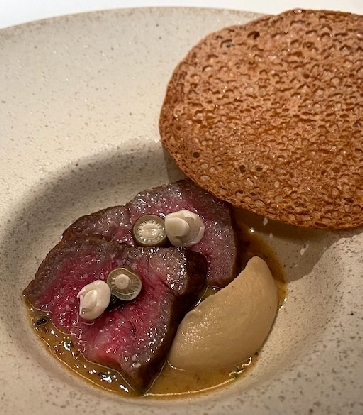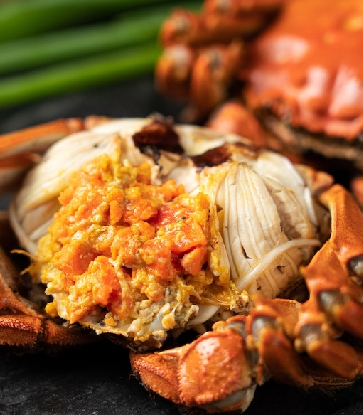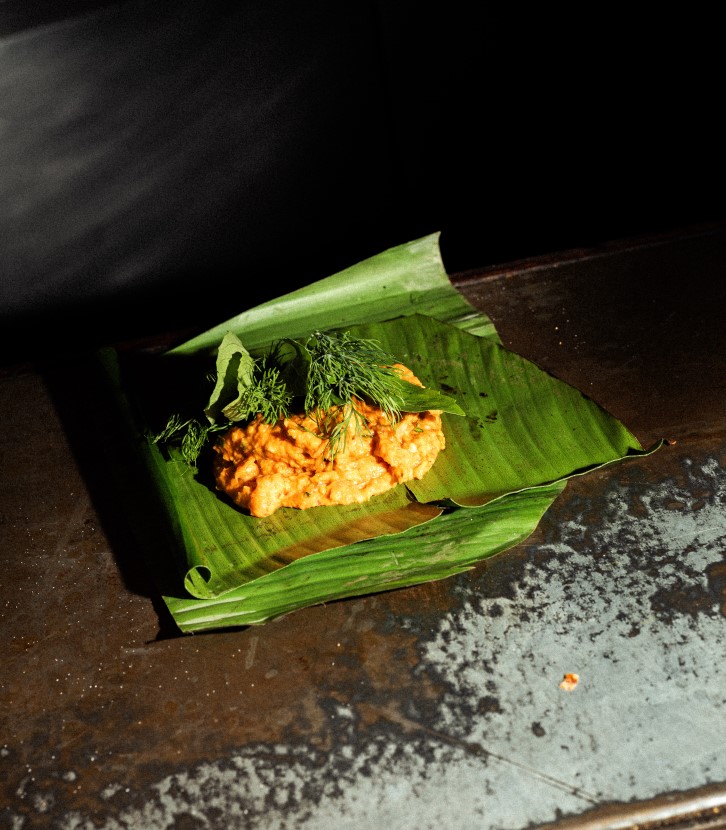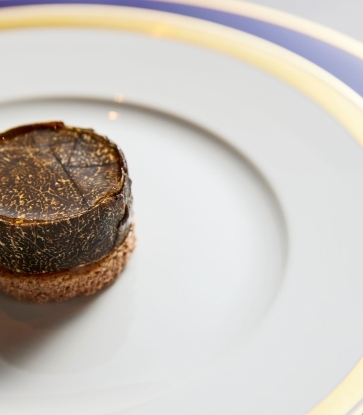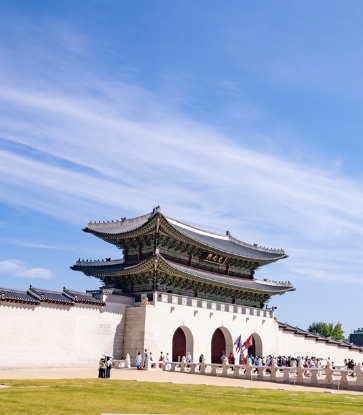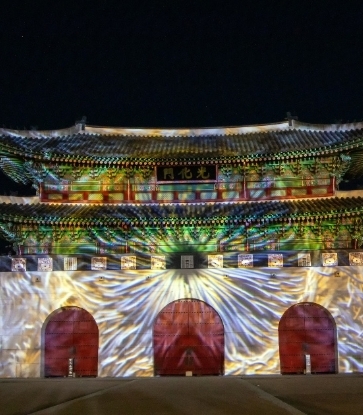Our MICHELIN Guide inspectors have been sharing some fresh new restaurants that have caught their eyes (and palates) which will be the new additions to the next MICHELIN Guide Seoul selection.
Every second Tuesday of the month, the new restaurants that will be part of the MICHELIN Guide Seoul 2024 will be featured in both the MICHELIN Guide Seoul website and the global MICHELIN Guide mobile application.
How to identify the new restaurants? They will be highlighted with a "New" symbol. Some of these newly recommended establishments will go on to earn distinctions(Stars, Bib Gourmand, Green Star, and Selected) at the MICHELIN Star Revelation ceremony, so check them out and add them to your list of places to dine at!
Here are the MICHELIN inspectors' favourite new additions in Seoul!
RELATED: Live Updates for the MICHELIN Guide Seoul
October 2023
This Autumn, our inspectors introduce three restaurants that will delight your eyes and palate with international cuisines featuring Korean ingredients
Essence
After a series of twists and turns, Chef Kim Yeong-seon wrapped up his famed career as a classic French chef at Restaurant Solei and opened Essence to offer his very own version of French cuisine. Here, the chef provides bistro-style French fare that is cozier and lighter, and therefore more accessible, than the fare at his previous restaurant. Although the winds of change are sweeping through the dining industry, he is steadfastly committed to the classic style, delivering deep flavors through precisely baked and cooked ingredients and carefully crafted sauces. In this era of contemporary cuisine that appeals to diners with a wide range of novel culinary styles, Essence’s unpretentious meals highlighting genuine authenticity remind us, once again, of the core of French cuisine.

Horapa
A short trip to Thailand and a serendipitous encounter with a local cookbook changed the course of his life and set Son Seung-hee on the path to chefdom. Enamored with the world of Thai cuisine, he has since poured his passion into mastering it, and his culinary dedication has found its culmination in Horapa’s fare. The vibrant flavors of spices and herbs amid the wafting aroma of charcoal – this street vibe in Thailand, and the street foods he savored, serve as continued inspiration for the eatery’s exotic and exclusive dishes. Chef Son seeks to remain true to the heart and soul of Thai cuisine while maintaining unmistakable originality in his fare by capitalizing on locally produced fine seasonal ingredients. This culinary philosophy leaves us awaiting Korea’s novel take on Thai cuisine.

Mater
With the focus on fermentation, Chef Kim Yeong-bin brings together the Korean and Asian cuisines he grew up with and the Western and Nordic cuisines he has been exploring as a chef, creating dishes bursting with unbridled imagination. Through the process of fermentation, the chef adds a unique twist to the flavor and texture of his ingredients, which are then exploited, sometimes subtly and at other times vigorously, for resonant and diverse expressions of fermented flavors. Such attempts reveal the kitchen’s intent and efforts to balance sour and umami taste profiles. Since Korea is where fermented foods are regular staples, it is all the more intriguing to witness Mater’s series of gastronomic experiments aimed at balancing the tastes and expressing the varied flavors of fermented dishes.

August 2023
3 brand new additions in August to the upcoming MICHELIN Guide features a Dwaeji-jukbap eatery, serves only one menu, located in Bukchon Village, Chinese restaurant that serves a dish made of fresh ingredients for 'precious' guests, and innovative restaurant that has been constantly reinventing the art of cuisine.
Anam
At this humble diner situated in Bukchon Village, Seoul, pork and rice soup is the only dish on the menu. Portions come in two sizes: medium and extra-meat. In the soup, a special oil made with Cheongyang chili pepper and kale is drizzled on top of the agreeably clean broth, with their culinary harmony creating a unique visual appearance and rich flavors. Plus, the Spanish Duroc baby pork ribs and thin slices of pork butt that complement the dish are exceedingly tender and boast subtle flavors, raising the gastronomic experience to a new crescendo. Visit Anam and enjoy a warm hearty bowl of its trademark soup. One last thing: Feel free to add cilantro to taste.

Haobin
Haobin is a Chinese restaurant helmed by Chef Hu Deok-juk, celebrated as a living legend of Korean-Chinese cuisine and a trailblazer who led the refinement of Cantonese cuisine. The restaurant’s title, which means “precious guests” in Chinese, reflects the chef’s respect for his diners. Haobin boasts a vast repertoire of signature dishes, including braised whole sea cucumber with Sichuanese sauce and fried noodles with stir-fried seafood. Yet, its best-known offering is the classic soup poetically dubbed “Buddha Jumps Over the Wall,” which was first introduced to Korea by Chef Hu and has remained the icon of his cuisine. “I strive to highlight the genuine flavors of the ingredients from the freshest ingredients.” This quote by the chef carries exceptional weight although it merely reiterates the time-tested principle of culinary art. In addition to diverse gastronomic delights, the establishment also offers various vigor-boosting dishes made with seasonal ingredients.

Ryunique
Since its opening in 2011, Ryunique has been constantly reinventing the art of cuisine, driven by Chef Ryu Tae-hwan’s independent research and creative interpretation of ingredients. The chef continually updates the menu to reflect the solar term and season, with an emphasis on fresh ingredients that vary by season and source. His talent for turning his unbounded gastronomic imagination into reality is the secret to Ryunique’s unique fare. Remarkably, this tidy and modern space is home to both the chef’s research center (first floor) and a dining area (second floor). All in all, there is something special about Ryunique’s cuisine that sparks our culinary imagination while never losing its freshness or charm.

July 2023
On July 2023, MICHELIN Guide Seoul has discovered the homey Italian ristorante nestled in an alley, a contemporary restaurant with the vast wine list and the food that best represents contemporary cuisine, and a restaurant serving fire kissed Spanish cuisine.
Oso Ondo
Oso Ondo, which means “very good” in Basque, is helmed by Chef Ryu Yeong-gi whose culinary career includes stints at Louis Cinq, Seoul and an eatery in San Sebastian, in the Basque region of Spain. The menu boasts an exquisite array of charcoal-grilled dishes, including the signature pescados, which features seasonal fish, and cochinillo, a succulent suckling piglet roasted to perfection, crisp outside and tender inside. Notably, the sauerkraut that accompanies cochinillo accentuates flavors by reducing any hint of greasiness. Visit Oso Ondo if you crave perfectly smoked meals, paired with the finest wines.

Il Vecchio
Il Vecchio is a down-to-earth, homey ristorante run by the chef couple Kim Min-gyun and Kim Bin-na. The eatery’s Italian fare brims with well-defined and focused flavors, and its signature dishes made with fresh local produce and seafood capture perfectly the tastes of the season. With meticulous execution, the chef duo cooks each and every ingredient to a precise degree with optimal juiciness, bringing out a range of nuanced flavors, aromas, and textures. Indeed, its semi-dried fresh pasta sets the standard for such extraordinary attention to culinary detail. At Il Vecchio, unrelenting gastronomic innovation that aims to delight diners with diverse yet consistent epicurean experiences is the norm. Just one caveat: The establishment is nestled in an alley, so parking may prove a challenge.

VINHO
Co-helmed by Chef Jeon Seong-bin and Sommelier Kim Jin-ho, Vinho features expansive window walls and an open kitchen fronted by an elongated counter. This spatial harmony creates a lively communal wine-and-dine ambiance. The vast wine list, coupled with careful service and food pairing, as well as deep-flavored sauces that exquisitely complement seasonal ingredients, makes the eatery a perfect venue to savor the pinnacle of contemporary cuisine. Its yellowtail tartare, which features dices of yellowtail mixed with sourdough crumbs and poached eggs and then wrapped with slightly grilled romaine, is served with a sauce featuring katsuobushi cream, parsley oil and lemon juice. The sweet and nutty flavor of the sauce provides the ideal accompaniment to the yellowtail’s fresh flavors. Vinho delights in showcasing how wine can heighten the allure of fine cuisine.

June 2023
3 new restaurants made their way to the upcoming MICHELIN Guide Seoul edition this June. This set of additions span restaurants and cuisines that range from a French-based pescatarian restaurant helmed by a Korean chef, an eatery that highlights charcoal-grilled flavors, to a restaurant serving creative contemporary dishes with refined finesse.
Artypique
Atypique, which means “atypical” in French, revolves around the constructs of “wood and fire.” Its charcoal grilled and flavored cuisine highlights the subtle and instinctual tastes of the ingredients. The chefs here smoke a wide gamut of meat and seafood ingredients, using diverse varieties of wood. They even offer butter and ice cream infused with smoky flavors, delighting the diner’s five senses. Plus, the restaurant’s “atypical” plating and wine glasses elevate the fare while delighting its patrons’ visual sensibilities.

L'impression
With “refined” and “essence” as its mottos, L'impression recently opened its doors anew in the same location, reinventing itself with new kitchen staff and culinary styles. Helmed by Chef Yoon Tae-gyun, the kitchen serves a menu whose ingredients can be unmistakably identified in its dishes. That is, the focus is on each ingredient’s natural flavors and bringing out intuitive tastes, with richly flavorful and aromatic sauces adding nuance to the primary ingredients. The plating appears neat and restrained. Nevertheless, it effectively unveils the inherent flavors of the ingredients that resonate through the varied and subtle tastes of the sauces. In essence, L'impression is where diners can enjoy discerning fare highlighted by the chef’s delicate sensibilities.

L'Oignon
Nestled in a quiet alley within the ultra-trendy Garosu-gil district, L'Oignon, which means “the onion” in French, is a French-based pescatarian restaurant that offers dishes made only with vegetables, fish, eggs and dairy products. With a steadfast dedication to the principles of ecological harmony and compassionate treatment of animals, the chef opened this eatery with the intention of imparting to patrons the wholesome sustenance he himself reveres. The kitchen uses vegetable broth with mushrooms as a substitute for rich meat broth and creates the texture of its cakes using cauliflower and pecorino cheese instead of flour. Yet, the umami flavors and textures produced through these novel means are as deep and as luscious as those concocted by conventional recipes. If the allure of a plant-based diet beckons, why not indulge in the captivating flavors of L'Oignon's pescatarian fare?

May 2023
For May, our inspectors discovered a homey bistro that offers delicately flavored French cuisine by using seasonal Korean ingredients, an establishment where the head Korean chef adds a spark of local flavors into traditional Chinese recipes, and an omakase where the dishes tell their own story by charcoal, fire, and paper.
Al'aise
Al’aise is a French restaurant headed by Chef Lee Byeong-gon, who has dedicated extensive efforts to experience and immerse himself in authentic French cuisine. The power of such conscientious dedication is instilled in his dishes that remain faithful to the basics and are brimming with honest passion to convey the innate flavors of the ingredients. The course meals feature an exceptional balance of ingredients and sauces, bringing out the long-standing and dependable flavors expected from fine French cuisine. Another distinct culinary delight is to be found in the kitchen’s classic French sauces adorned with the chef’s singular twists. Treat yourself in this homey and cozy bistro that offers delicately flavored French fare crafted with imaginative seasonal Korean ingredients.

Zhonghuafuchun Salon
To convey its authenticity to diners, a cuisine that transforms and responds to changing times must be founded on a clear and accurate understanding of culinary tradition. At Zhonghuafuchun Salon, Chef Nam Bok-chun’s concern for and dedication to bringing positive change to Chinese cuisine is unmistakable in its culinary creations. The chef pays particular attention to selecting quality ingredients, the basic building blocks of good food, while engaging in active exchanges with chefs in mainland China, to promote a gradual evolution in his native cuisine, one dish at a time. Zhonghuafuchun Salon is a fascinating Chinese establishment, where traditional Chinese recipes combined with local twists translate into a feast of richly flavorful dishes.

Hakusi
Charcoal, fire and paper – these are the three themes Chef Choi Seong-hun seeks to convey in Hakusi’s captivating culinary narrative. The triumphant result is a testament to his masterful storytelling. Beginning at the entrance and extending all the way to the dining area, an arresting visual tableau of black and red imbues the space with personality, punctuated by white elements that exude a sense of harmony and stability. This vivid vitality is also manifest in the establishment’s distinctive cuisine that reflects the chef’s vast culinary experience. In every dish, the allure of seasonal ingredients is brought to life in vivid detail, with distinct flavors and aromas, which transcend the boundaries between modern and classic cuisine, figuring prominently.

April 2023
This month features new inspector finds — a ramen joint owned by a second-generation chef that combines original, classic, and trendy flavors and a grill house that boasts unique barbecue skills and presentations;.
Sarukame
Sarukame is currently run by its second-generation owner-chef Hiroto Honma. Going beyond merely retaining the title of the restaurant, the current chef is carrying on its culinary legacy by staying in contact with its founder and preserving its original recipes. Such effort, coupled with Chef Honma’s vast experience in the restaurant business and gastronomic sensibility, garnered and developed over the years working in cities around the world, are adding new narrative layers to this establishment. Sarukame continues to create exclusive menus that combine the flavors of trendy ramen in Japan, classic flavors and new original flavors, thereby shaping its brand identity and serving the ever-changing needs of Seoul’s ramen aficionados.
EL PIC
El Pic, once a famed grill house on Jeju Island, has found its new home in Seoul. Although dry-aged, wet-aged and beeswax-aged beef steaks are signature dishes at this steakhouse, its grilled fresh seasonal squid, caught in the waters off Jeju Island, and ceviche are pleasant surprises as well. The way the steaks are grilled is extraordinary: They are cooked over charcoal at low temperature and cooled, with the process repeating for more than 30 minutes to maximize tenderness and juiciness. The sliced meat looks red, but is indeed cooked to perfection. Pair the meat with wine for additional gastronomic indulgence.

March 2023
In March, our inspectors dug deep and unearthed hidden finds such as a hole-in-the-wall ramen eatery hidden down a quiet alley, the place that serves a mere three chicken-based menu located nearby the elementary school, and a humble advocate of zero-waste dining hidden in a residential neighbourhood behind Yongsan station where diners dine wander from space to space.
Kyewol Gomtang
Kyewol Gomtang in Seongsu-dong specializes in Korean chicken soup or gomtang, as the name of the eatery plainly suggests, with the menu consisting of a mere three chicken-based offerings. Warm rice, chicken breast slices tenderly cooked at low temperatures, winter cabbage blanched to crunchy perfection, and clear broth skimmed of fat – all culminate in clean yet rich flavors in the soup. For lunch, spicy seasoned chicken with laver chips; and boiled chicken, which is then marinated with soybean paste and torch-grilled, are available as wallet-friendly side orders. The joint’s cold noodle soup, a summer special, is another not-to-be-missed treat.

Damtaek
Damtaek is a cozy little ramen haven nestled in a quiet alley near Hapjeong Station. Chef Jo Won-hyeon has purposefully adorned this quaint space with vintage artifacts. The restaurant’s shio ramen, and associated variations that use the same soup base, are in stark contrast to its homey, down-to-earth vibe. The refined and clean flavors of the soups are singular and inspire lingering addiction. With a passion for creating tastes unbound by culinary convention, the chef has persistently dedicated his craft toward perfecting the art of shio ramen, creating ramen that can delight any palate.

Level:0
Level:0 is tucked in the residential area behind Yongsan Station. The name of the joint has a double meaning: the first floor and the pursuit of zero-waste cooking focused on sustainability. Here, diners can enjoy their multi-course meals in a nomadic fashion as they wander from space to space. This petite gastronomic pilgrimage commences from a communal table and concludes in a small garden via the main space that is home to the kitchen. Committed to sustainable dining, the chef reuses leftover ingredients by drying them into powder or fermenting them. The establishment also sources its beef from organic farms. On the aesthetic side, its tarts in the shape of a finely manicured garden, and a dessert resembling a table, are a delicate feast for the eyes as well as the palate. Since Level:0 adjusts reservations to avoid crowding, double-check with the restaurant before visiting.




